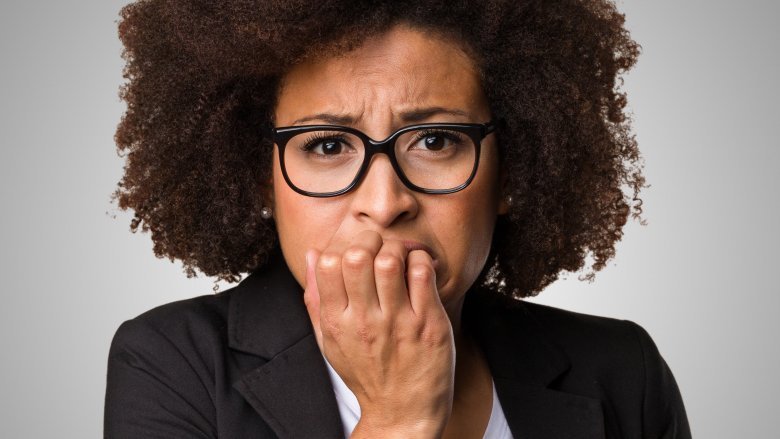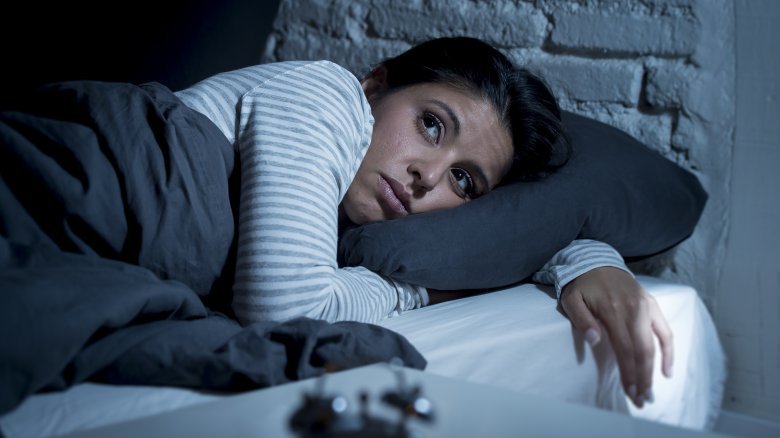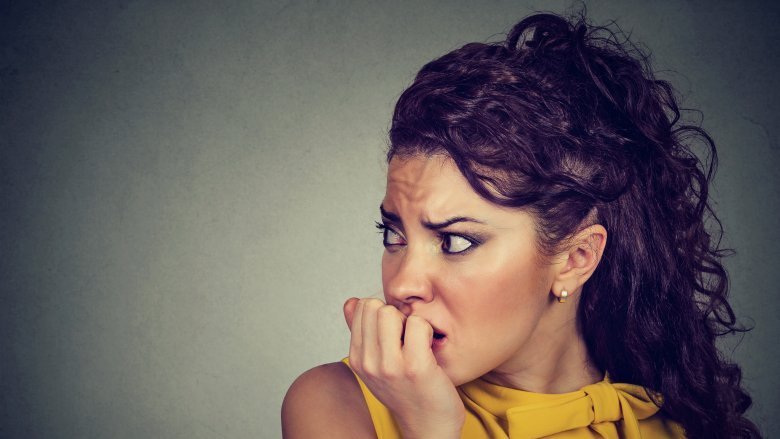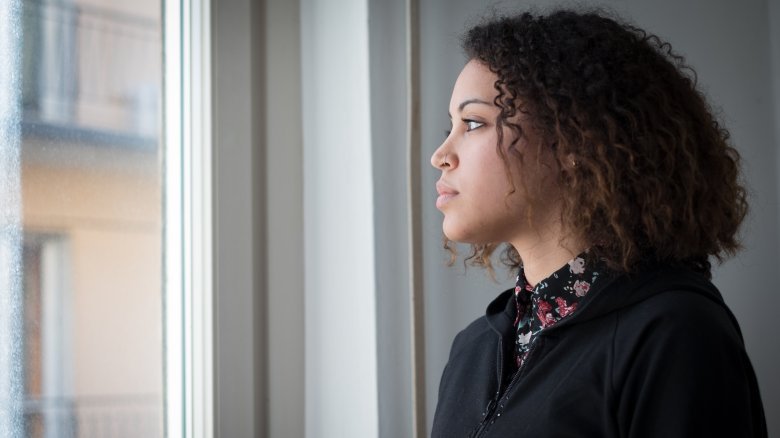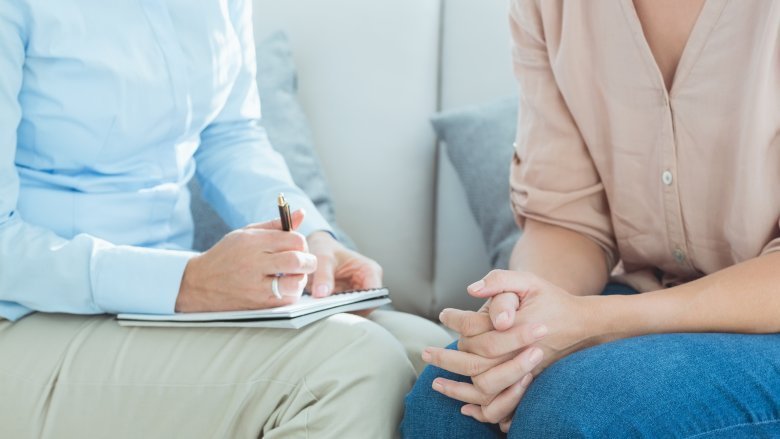Signs You May Have An Anxiety Disorder
Virtually everyone will get anxious about something at some point in their lives; it's a natural, healthy emotion we experience when we're faced with stressful and worrisome events. Once the situation is resolved — your test came back negative, you passed the class, you got the job — the anxiety naturally recedes.
But for some people, myself included, the anxiety might not go anywhere. We find ourselves worrying about something else now and unable to relax or calm down, in spite of the fact that the stressor has been removed. Or maybe there never was a major stressor at all and we're fixating on minor issues as if they were more major. Perhaps there was never a worrisome event to stress out about but we're just always concerned about something.
Sounds familiar? If so, read on about these signs that you may, like me, have an anxiety disorder.
You have trouble sleeping
Everyone needs a healthy amount of sleep in order to function. But if you have an anxiety disorder, it may be robbing you of your precious beauty rest. "Sometimes insomnia, or difficulty sleeping, is a strictly physical condition," noted Jor-El Caraballo, LMHC, a New York City-based therapist. He told me, "However, for some, routine difficulty in falling or staying asleep may have emotional roots. If you find your sleep disrupted then it may be helpful to ask yourself, how am I feeling? And do I have any worries or concerns about something that happened today or is to happen soon?" So you'll want to find the root of your insomnia before it makes your anxiety worse.
And it can really be a vicious cycle. Julienne B. Derichs, a licensed clinical professional counselor, described it, telling me: "You wake up tired but go a 'hundred miles an hour' until you're exhausted and you fall into bed... and then you can't fall asleep or stay asleep. You get up and repeat the whole pattern again. If you find yourself laying awake worrying about money, or what you have to do the next day, or about nothing in particular, this is often a sign of an anxiety disorder." Check in with your doctor if you're struggling with sleep disruption.
You have physical symptoms
Anxiety, although it is a mental condition, has a variety of physical symptoms. Dr. Angela Kenzslowe, clinical psychologist and founder of Purple Heart Behavioral Health, LLC, told me, "Anxiety is our body's natural reaction to real or perceived danger — it is our flight or fight response. When we have anxiety our body responds with physical sensations such as increased heart rate, quick and shallow breaths, increased adrenaline, feelings of impending doom, increased muscle tension, increased perspiration, lightheadedness, and chest pains." While you may not experience all of these, if you're experiencing some of them regularly it could be a sign of a disorder.
Additionally, Lisa Herman, Psy.D., a licensed psychologist with expertise in anxiety related disorders, told me you'll know you're anxious if "you have excessive physical symptoms of anxiety/panic that come often and sometimes out of the blue. This is typically what people realize first — their heart racing, sweating, shaking, etc. — and people will contact their doctor or go to the ER in some cases because these symptoms feel so bad." So if your symptoms are so bad that you wind up in the hospital thinking you're having a heart attack, you could very likely be mistaking that for a panic attack.
Other symptoms can include digestive issues, headaches, exhaustion, and muscle tension, according to counselor Caraballo.
You're self-medicating
There's nothing quite like getting off work, hitting up happy hour, then coming home to binge on your favorite Netflix series. That falls into the realm of normal behavior on Friday night, for sure, and there's nothing wrong with escaping into video games and a beer once in a while, either.
There's only an issue if you're doing this constantly, relying on booze or distractions to get your mind off everything you're worried about to the point of escapism. Annie Wright, a licensed psychotherapist, told me, "If you find yourself needing extensive zone-out time after work and on the weekends, turning towards your coping mechanisms more often than not — such as substances or behaviors like using alcohol, weed, excessive gaming, constant Netflix, etc. — all in an effort to escape your life, this could speak to an underlying anxiety disorder."
Before you go down the rabbit hole binging all of Jessica Jones in one night and bringing a bottle of wine with you, make sure you're dealing with your stressors and issues accordingly.
You worry excessively
When you have an anxiety disorder, you're very likely worried about something all the time. Bruce W. Cameron, M.S., a licensed professional counselor, told me, "Anxiety is not like a phobia that has a specific target. It's worse. You feel that sense of doom is going to come out of nowhere. This anticipation feeds itself like a loop, and you can't seem to get out of the cycle." So you'll worry about something until it's resolved, then you'll fixate on a new problem. I do this all the time.
Counselor Caraballo told me that it's a good indicator that you're doing this if someone tells you that you worry too much. He said, "In my experience, people with very high or severe anxiety are unable to control their worry or constant analysis of almost every decision in their lives. What is sometimes difficult to notice in ourselves is much more visible to others. If the people closest to you have said these words, it might be worth speaking to a doctor or therapist about anxiety." And even if no one has said anything, you can ask friends or family if they have observed this in you. That's a good way to gauge your level of stress.
But be careful not to rely on other people's observations for constant reassurance as that could also be anxiety manifesting. Counselor Derichs says this is possible if "you need constant reassurance about how you look, or the choices you have to make, or upcoming decisions."
You can't focus
Do you find yourself unable to finish tasks or pay attention to your normal activities? Are you distracted by racing thoughts that kill your productivity? Anxiety could be the culprit, disrupting the flow of your daily life. Counselor Caraballo told me, "It's very common for those living with anxiety to experience disruption in their productivity at work or school." And this can have some very real world consequences. Caraballo continued, "For some, this disruption can lead to negative performance reviews, failing grades, or even termination or failing out. For others, they may be able to recover but still find themselves easily distracted or frustrated when trying to accomplish tasks. If you experience any of these, its possible that anxiety may be playing a role in your difficulty focusing."
So in order to make sure you remain employed or enrolled, make sure to talk to someone about your productivity issues and why you're having them. Chances are you need a little bit of help to stay on track, so consult with a mental health professional or your primary care doctor for a referral.
You're afraid of large, public spaces
On good days, I don't mind going out to the store and enjoy the act of getting out and about. But on bad days, the idea of heading into a big box store is my idea of hell. This is not uncommon for people who struggle with social anxiety disorders. Kim Shashoua, LMSW, elaborated. She told me, "Do large spaces, like malls or cavernous stores (such as Bed Bath & Beyond) make you uncomfortable? If your nervous system is on the lookout for threats, you could notice a reaction to those spaces." So why are these spaces such a trigger for some people? Why are we on edge? Shashoua said it's because "large spaces are harder to control and scan for threats, so they can seem much scarier than small spaces."
If you find yourself avoiding these places all together, that could be an indicator that you're wrestling with social anxiety — especially if you find yourself not wanting to leave your home at all.
You can't experience joy
Along with the debilitating symptoms, racing thoughts, and constant worry, one of the cruelest things about having an anxiety disorder is the way it can rob you of joy. Psychotherapist Wright told me, "With an anxiety disorder, the things that used to bring you pleasure — whether this is a cherished yoga class or a monthly ritual of getting together with your girlfriends — these same things don't bring you joy anymore. They may feel like burdens or events you want to avoid because it feels like more of an effort than a support."
So if you are constantly on edge and unable to have fun hanging out with your cats or going for a swim, consider why that might be. If it's because you're always somewhere else thinking about everything that could go wrong (I get it), stop, breathe, and if need be, check in with a mental health counselor. The right balance of therapy and, if needed, medication can help you restore your sense of zen.
You second guess yourself
Anxiety has a way of eroding our trust in ourselves. After a while, you might not even listen to yourself, or discern between what the anxiety is telling you and what your gut is telling you. Peg O'Connor, Ph.D., an expert author for Pro Talk on Rehabs.com, told me, "Second guessing yourself is, at rock bottom, not trusting yourself. You might be afraid to make any decisions because you don't trust your decision-making ability."
And even if you can make a decision, noted O'Connor, you're still going to be in knots over it. She continued, "If you do reach a decision, you may feel as if it will be the wrong one because you are the one who made it. This may prompt you to disregard the knowledge or insight you possess or to go against your intuition or gut instinct." So you basically sabotage yourself by discrediting your own knowledge and instincts.
And that can really erode your confidence. According to O'Connor, "Lacking trust in yourself leads to a kind of confirmation bias: everything that doesn't go well or turns out badly will count as proof that your decision-making ability is flawed." So you're basically stuck in a loop, an anxiety-induced inception.
While it's natural for all of us to doubt ourselves here and there, this sort of crippling lack of self-trust is likely the result of anxiety.
Your energy is low
Some days are just a slog when you're anxious all the time. Psychotherapist Wright told me, "If it feels like getting through each day is like walking up a mountain with a backpack of rocks, if you feel like you barely have the mental, emotional, and physical energy to handle your life anymore, if your overall energy levels are greatly diminished, this could be a sign of an anxiety disorder."
And it's not surprising, given that your body is so often in a state of fight or flight. Or if your sleep is interrupted, then clearly you're not getting enough rest. Couple that with extensive and obsessive worry, and you have a recipe for utter exhaustion. I can't even have a cup of coffee for a pick-me-up because it makes me too anxious — and that's cruel.
But there are ways you can fight it. Talk to our doctor about both anxiety and sleep medication, as they can really help conquer your symptoms. And I always do better when I get an hour of cardio, which calms my mind and helps me focus. Your mileage may vary.
How to reduce anxiety
Asta Klimaite, M.A., a licensed clinical professional counselor, shared some anxiety fighting tips with me that might help. She said:
• Identify your anxiety triggers and try to minimize them. For example, if you are stressed out and anxious in the morning about being late to work/school, set your alarm five minutes earlier.
• I ask my clients to take a jog or do yoga in the morning to help them calm down.
• Set yourself up for success in terms of your anxiety — plan ahead to minimize it. For example, if you get stressed at work, talk to your boss about having an appropriate work load (I know it's easier said than done!). You have to teach others how to treat you. You also have to teach yourself how to treat you.
• I ask my clients to fill out a gratitude journal at night to help them refocus on the positives.
• I also ask my clients to write down their anxious thoughts in the morning and work on changing them to more positive ones. I ask clients to practice re-framing those thoughts every day
As always, talk to your doctor about what's best for you in your fight against anxiety.
